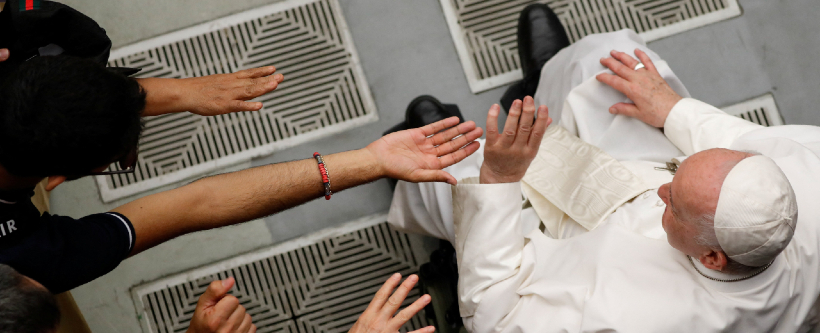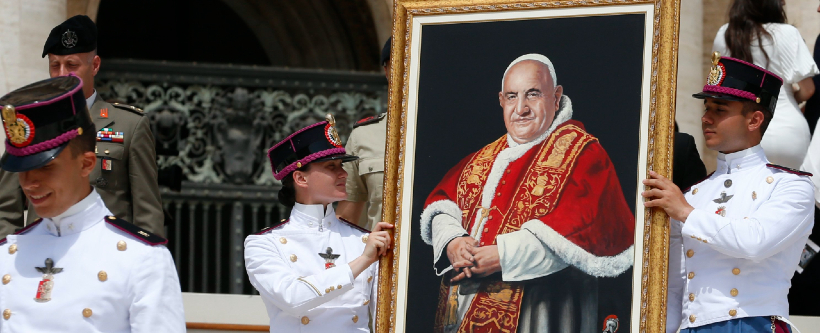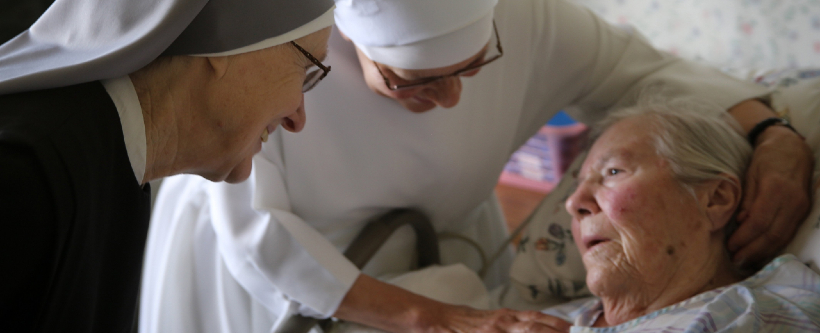
After having considered the two accounts of the book of Genesis, our reflection on God’s original design on the man-woman couple is now addressed directly to Jesus
At the beginning of his Gospel, the Evangelist John recounts the episode of the Wedding at Cana, in which the Virgin Mary and Jesus, with his first disciples, were present (Cf. John 2:1-11). Not only did Jesus participate in that marriage, but he “saved the celebration” with his miracle of the wine! Therefore, the first of his prodigious signs, with which he revealed his glory, he carried out in the context of a marriage, and it was a lovely gesture for that nascent family, solicited by Mary’s maternal concern. This makes us recall the Book of Genesis, when God finishes the work of creation and makes his masterpiece; the masterpiece is man and woman. And here, in fact, with this masterpiece is where Jesus begins his miracles, in a marriage, in a wedding feast: a man and a woman. Thus Jesus teaches us that the masterpiece of society is the family: man and woman who love one another! This is the masterpiece!
Since the time of the Wedding at Cana, so many things have changed, but that “sign” of Jesus contains a message that is always valid.
Today it does not seem easy to speak of marriage as a celebration that is renewed in time, in the different stages of the whole life of the spouses. It is a fact that persons who marry are always fewer; this is a fact: young people do not want to get married. Instead, in many countries the number of separations increases, while the number of children decreases. The difficulty to remain together – be it as a couple, be it as a family – leads to breaking the bonds with ever greater frequency and rapidity, and, in fact, it is the children that are the first to bear the consequences. But let us think that the first victims, the most important victims, the victims that suffer most in a separation are the children. If you experience from the time you are little that marriage is a bond for “a determined time,” it will be so for you unconsciously. In fact, many young people are led to renounce the project itself of an irrevocable bond and of a lasting family. I think we have to reflect very seriously on why so many young people “don’t feel like” getting married. There is this culture of the provisional … everything is provisional, it seems there is nothing definitive.
This fact of young people not wanting to marry is one of the concerns that emerges today: why don’t young people marry? Why do they often prefer to live together and, so often, with “limited responsibility”? Why do many – also among the baptized – have little trust in marriage and the family? It is important to try to understand, if we want young people to be able to find the right way to follow. Why don’t they have confidence in the family?
The difficulties are not only of an economic character, although these are truly serious. Many hold that the change that has happened in these last decades has to do with the emancipation of woman. However, this argument is not valid either; it is a falsehood, it’s not true! It is a form of machismo that always wants to dominate woman. We make the bad figure that Adam made when God said to him: “Why have you eaten the fruit of the tree?” and he <answered>: “The woman gave it to me.” And the fault is the woman’s. Poor woman! We must defend women! In reality, almost all men and women would like affective stability, a solid marriage and a happy family. The family is at the top of all the indexes of satisfaction among young people; however, out of fear of making a mistake, many do not even want to think about it; although they are Christians, they do not think of sacramental marriage, unique and unrepeatable sign of the alliance, which becomes a testimony of faith. In fact, perhaps this fear of failing is the greatest obstacle to receiving the word of Christ, who promises his grace to the conjugal union and to the family. The most persuasive testimony of the blessing of Christian marriage is the good life of Christian spouses and of the family. There is no better way to describe the beauty of the Sacrament! Marriage consecrated by God to safeguard that bond between man and woman that God has blessed since the creation of the world; and it is source of peace and of goodness for the whole of conjugal and family life. For instance, in the early times of Christianity, this great dignity of the bond between man and woman overcame an abuse held then to be altogether normal, that is, the right of husbands to repudiate their wives, even with the most pretentious and humiliating motives. The Gospel of the family, the Gospel that in fact announces this Sacrament has overcome this culture of habitual repudiation.
The Christian seed of the radical equality between spouses must bear new fruits today. The testimony of the social dignity of marriage will become persuasive in fact this way, the way of witness that attracts, the way of reciprocity between them, of the complementarity between them.
Therefore, as Christians, we must become more exacting in this regard. For instance: to support with determination the right of equal compensation for equal work, why is it taken for granted that women must earn less than men? No! They have the same rights. The disparity is a pure scandal! At the same time, to recognize the maternity of women and the paternity of men as an always valid richness, for the benefit especially of children. Likewise, the virtue of hospitality of Christian families is of crucial importance today, especially in situations of poverty, degradation and family violence.
Dear brothers and sisters, we are not afraid to invite Jesus to the marriage feast, to invite him to our home, so that he is with us and watches over the family. And we are not afraid to invite his Mother Mary also! When Christians marry “in the Lord,” they are transformed into an effective sign of the love of God. Christian do not marry only for themselves: they marry in the Lord in favor of the whole community, of the entire society.
I will speak of this beautiful vocation of marriage also in the next catechesis.
* * *
Speaker:
Dear Brothers and Sisters: As we continue our catechesis on the family, we look to the marriage feast at Cana, where Jesus performed his first miracle, changing water into wine, at the prompting of Mary his Mother. In this way, he showed his loving concern for the couple and gave a “sign” which has much to tell us about the meaning and importance of marriage itself. Today, society is confronted with fewer marriages. In many countries, separation of couples is increasing, while the number of children is decreasing. These broken marriage bonds affect the young most of all, as they come to view marriage as something temporary. Perhaps there is a fear of failure which prevents men and women from trusting in Christ’s promise of grace in marriage and in the family. And yet, in truth we know that almost every man and woman desires a secure and lasting relationship, a stable marriage and a happy family. The most effective witness to the blessing of marriage is the good life of Christian spouses and their families. The consecration of their love by God is the font of their peace and fidelity. To make these blessings more evident to the world, the equality enjoyed by the spouses must produce new fruit – equal opportunities in the workplace; a new valuing of motherhood and fatherhood; and a greater appreciation for the openness of families to those most in need. Let us not be afraid to invite Jesus and Mary to the marriage feast, for Christian spouses marry not only for themselves but for the good of the community and for all of society.
Pope Francis:
I offer an affectionate greeting to all the English-speaking pilgrims and visitors present at today’s Audience, including those from England, Ireland, Sweden, Africa, Australia, Japan, Indonesia, Malaysia, the Philippines, Canada and the United States. May your pilgrimage to the Eternal City confirm you in love for our Lord and his Church. May God bless you all!
* * *
I give a cordial welcome to the Italian-speaking pilgrims. I greet the priests of Milan, the seminarians of Messina and Catania, the pupils of the Vatican School of Library Science. I greet the parish groups, the students and the Associations, in particular Anita and the Italian Feminine Center of Sardinia. May the visit to the Tombs of the Apostles foster in all a renewed adherence to the Gospel, a sincere solidarity with brothers and a rediscovery of Christian joy.
A special thought goes to young people, the sick and newlyweds. Today we celebrate the feast of Saint Catherine of Siena, Patroness of Italy and of Europe. And we greet our Patroness with applause! May her existence make you understand, dear young people, the meaning of a life lived for God; may her indestructible faith help you, dear sick, to trust in the Lord in moments of discomfort; and may her strength with the powerful indicate to you, dear newlyweds, the values that really count in family life.






Facebook Comments